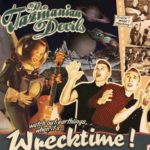In the house on the corner of Deribasovskaya-Richelevskaya, grandmother’s ghost is still clacking with an ectoplasmic jaw. If the invaders do not come, their weighty relics will beat the wolves of the Circumpolar region. Having been born on the Odessa Privoz, having galloped through the Kiev Podol and the frosted Tobol, this song settled in Kolyma and Magadan to be spread barefoot throughout Russia. Azohenway, Moon Dogs, it’s time to talk about urban romance!
Being nourished on hard labor and burlat songs, nurtured by Moldavian gypsies, near-Carpathian klezmer and morally dubious poetics, urban romance was already a powerful force in imperial times. “And what about Siberia? I’m not afraid of Siberia! Siberia is also a Russian land!” – the song “Chubchik” threw off the shackles from the soul more cleanly than Pierre Bezukhov. Bezukhov was then accessible to few, but the philosophy of the “rabble” was primary, Count Tolstoy also in Sevastopol caught a deep understanding of metaphysics by such heroes as the sailors Petr Koshka and Fedor Stammerer.
Yesenin and Severyanin were also metaphysical urban romantics in their own way, but the phenomenon of this special type of Russian song entering North American soil is more interesting. A kosher example is Dmitry Zinovievich Temkin, a Jew from Poltava province, the author of soundtracks to the best films of Frank Capra. It was his perception of cowboys, like Rosenbaum’s Cossacks, that made it possible to create the song Rawhide, the standard that defined the development of the cinematic cowboy song and suspiciously similar to “Two Urkans ran from the Odessa Kichman.”
The phenomenon of the Raznosola ensemble is precisely that they seem to bring back to us our songs, passed through the millstones of Western Moloch, which, like the girl in Boccaccio’s Decameron, remained untouched. Who are VIA Raznosoli? The iconic rockabilly band The Spootniks from Petrograd, complemented, yes, by a violin and a little accordion. Sergei Shornikov, a wild islander from Vasilyevsky Island, is in charge of the nativity scene. “The First covidous” is another record by the God-pleasing band, stock up on crab-flavored matzo!
“Cowboy” is a vivid example of an Odessa song with a serious yodeling to the point of malice. We saw cowboys like that in the synagogue, with individual curls hanging out from under their hats.
“Tsvetiki” is an endearing careless parody of Pyotr Leshchenko. Well, okay, the horse and the bear were dancing, the vocalist was gypsy. Both this song and all the others were recorded right away, without resorting to unnecessary vignettes. The only correct approach. That’s what Arkady bequeathed.
“Stizhki-tracks” is a mischievous reinterpretation of Valentina Tolkunova’s smash hit. The spring flood will wash away the traces of Gray’s feet, but the polar waltz will remain.
“Ogress” opens with the well-known motif “they will bite, beat and offend you” and continues as a Little Russian hopak. The coupleteer, tired of the role of the alpha male, still growls, driving away the applicants.
More intelligent researchers will call “King Kong” a rumba, but here you can hear the uncompromising Frankenstein’s monster, multiplied by the mosquito charisma of the violin. If any of the readers are the same uncle from the shoe polish factory, let them send a part to the orchestra for stage makeup.
“The Song of the Lost” is very hooligan. It would be fine if only he was swearing, because this one slaps the double bass like a palm on a tabletop! Is there a justice for these dudes?!
“The Song of the Light” deserves special attention for the skill and sincerity of its performance. Starting with the famous riff that Elvis also used, it continues with a convulsive violin and the meowing of the main March Vasileostrovsky cat. Are you guys going to be careful of him there?
“Jesus” is a rehash of the hit “Rested” by another rockabilly band, the legendary The Stockmen. The Raznosol version is much more impressive than the original broken shuffle, all those saloons with whores, cinematography and blackjack performed by Boyarsky come back to mind.
The “Lad is moving” at a slightly more frenzied pace than befits the usual Ladoga ice. In my mind’s eye, Yesenin and Severyanin are dancing elbow to elbow in the smoke of a drunken Russian tavern. I want to hit the ground with my hat and run after them.
The “black horseshoes” may have fallen off the horse while dancing with the bear. Without bringing happiness to the hero of this story, they bring joy to every listener and every camp.
“Ship on the raid” is a NEP canzone for romantics, whose white trousers never sailed to Rio, but their soul is full of longing.
“I will not succeed” is the best duet since the time of Edith and Leonid Utosov with a quote from the great “Oh, the roads” and a playful hint at another duet that is not accepted to be mentioned in society. This final song is exactly the case when I tasted all the different dishes at the table, but I still want to.
VIA Raznosoli/The Spootniks is an undoubted Phenomenon in Russian music, which would sound from every airship and stagecoach if the editors of radio stations were not such petty-bourgeois rodents. Having once plunged into this “Gulf of Finland” of cheerful dissolute prowess, few people manage to swim ashore, and even then only after a week or a month. Lehaim, Orthodox Christians!


















